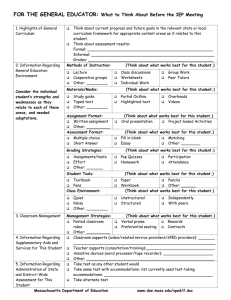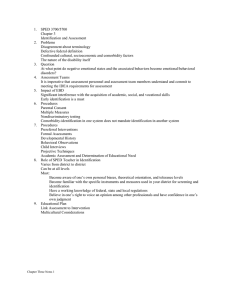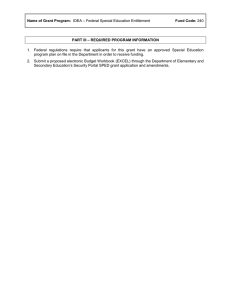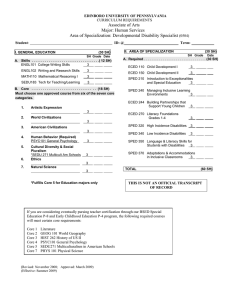San Diego State University Imperial Valley Campus Division of Special Education
advertisement
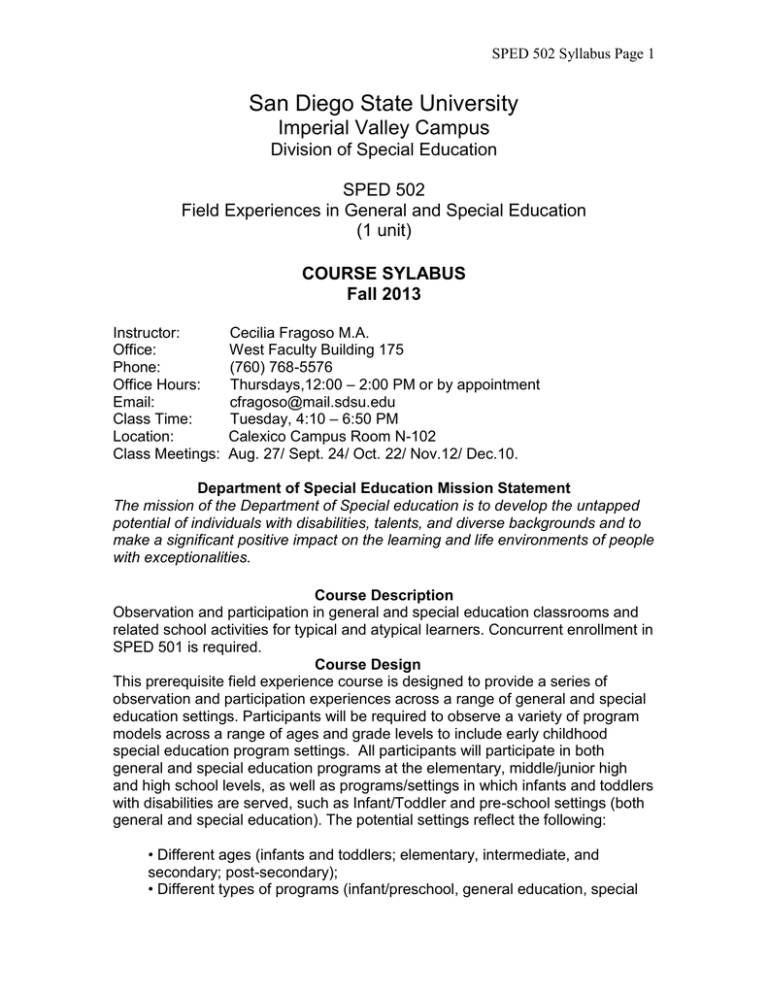
SPED 502 Syllabus Page 1 San Diego State University Imperial Valley Campus Division of Special Education SPED 502 Field Experiences in General and Special Education (1 unit) COURSE SYLABUS Fall 2013 Instructor: Office: Phone: Office Hours: Email: Class Time: Location: Class Meetings: Cecilia Fragoso M.A. West Faculty Building 175 (760) 768-5576 Thursdays,12:00 – 2:00 PM or by appointment cfragoso@mail.sdsu.edu Tuesday, 4:10 – 6:50 PM Calexico Campus Room N-102 Aug. 27/ Sept. 24/ Oct. 22/ Nov.12/ Dec.10. Department of Special Education Mission Statement The mission of the Department of Special education is to develop the untapped potential of individuals with disabilities, talents, and diverse backgrounds and to make a significant positive impact on the learning and life environments of people with exceptionalities. Course Description Observation and participation in general and special education classrooms and related school activities for typical and atypical learners. Concurrent enrollment in SPED 501 is required. Course Design This prerequisite field experience course is designed to provide a series of observation and participation experiences across a range of general and special education settings. Participants will be required to observe a variety of program models across a range of ages and grade levels to include early childhood special education program settings. All participants will participate in both general and special education programs at the elementary, middle/junior high and high school levels, as well as programs/settings in which infants and toddlers with disabilities are served, such as Infant/Toddler and pre-school settings (both general and special education). The potential settings reflect the following: • Different ages (infants and toddlers; elementary, intermediate, and secondary; post-secondary); • Different types of programs (infant/preschool, general education, special SPED 502 Syllabus Page 2 education inclusive programs, special education pull-out programs, special education special day programs, and special education related services programs) that reflect a variety of pedagogical approaches to teaching basic skills and for providing special education services to typical students and those with disabilities; • Different disability groups (e.g. Specific Learning Disability, Intellectual & Developmental Disabilities, Physical, Sensory and Health Disabilities, Emotional and Behavioral Disabilities, Visual Impairments, Deaf/Hard of Hearing, and Autism & other Pervasive Developmental Disabilities). Course Design: Participants will be provided with instruction in observational skills related to observing student and teacher behaviors and with observational protocols to guide their experiences. In addition to observing in various settings, they will support or assist teachers and service providers in program delivery in rudimentary ways that require little instructional skill sophistication. Participants will keep reflective journals; and, during the seminar portion of SPED 502, individuals will share and explore these reflections as they begin to build their personal understanding and philosophy of general and special education. Individuals will observe in five general and special education settings a minimum of 3 hours per observation. A portion of this time will be spent meeting with the service providers to discuss how they plan for instruction and monitor student progress. In addition, they will confer with other educators and parents, if appropriate. The remainder of their time will involve observation/participation in programs serving typical students and those with disabilities. SPED 502 seminars meet 5 times during the semester, with each seminar session lasting approximately 2 hours and 40 minutes. In addition to the text material provided in SPED 501, there will be a reading list of articles from recent professional journals and a textbook. Course Objectives: Develop observation skills of students in a variety of settings to include preschool. Compare and contrast methods and techniques used by teachers in various general and special education settings. Identify formal and informal assessment practices in general and special education settings, pre K-12. Observe, participate in, and analyze general education and special education classroom settings in terms of the variables affecting the typical learners, and those with disabilities, related to environmental and curriculum needs. Distinguish from among several diverse general and special education settings (from the least to the most restrictive environments) the options available for typical students and those with disabilities. Write comprehensive descriptions of educational settings in both general SPED 502 Syllabus Page 3 and special education. Write general descriptions of (and the possible options for) the cognitive, socio-emotional, and physical needs of general education students and those with disabilities. Engage in professional dialogue. Course Expectations: In addition to the visitations, this course will have 5 seminar meetings of 2 hours and 40 minutes each. Students are expected to follow the assigned visitation schedule, attend all classes, read all assigned materials prior to class attendance, and complete the written course assignments. A portion of your grade will be based on your participation in seminar discussions and activities. Students will be expected to complete an observation protocol for each visitation and to provide observational entries in their reflective journals. During the seminar meetings students are expected to be active participants in the discussions of the visitations and the relationship of their observations to the material covered in the SPED 501 course. Student Conduct: Students preparing to become special educators are expected to conduct themselves in a highly ethical manner that is consistent with the Council for Exceptional Children Code of Ethics and Standards of Professional Practice as well as with SDSU Statement of Student Rights and Responsibilities. (Note: former can be found on the Council for Exceptional Children Web Pages: http://www.cec.sped.org/ps/code.html and the latter can be found on the SDSU Web pages: http://www.sa.sdsu.edu/srr/statement/index.html) In this course, each student is expected to contribute to a positive learning environment by being on time to class, remaining in class the entire session, turning off cell phones and beepers, and, in all class-related interactions, treating others in a manner that is courteous and that promotes mutual respect and equality of others. Further, students are expected to exhibit academic conduct that reflects the highest levels of honesty and integrity. The Student Disciplinary Procedures for The California State University specifically prohibit cheating or plagiarism and provide that such acts may result in a student being expelled, suspended, placed on probation, or given a lesser sanction. PLEASE NOTIFY INSTRUCTOR OF ANY NECESSARY SPECIAL CIRCUMSTANCES THAT MAY EFFECT YOUR PARTICIPATION IN ANY OF THE BELOW ACTIVITIES AND ANY SPECIAL NEEDS THAT YOU MAY HAVE. PLEASE DO THIS DURING THE FIRST WEEK OF SESSION. SDSU Policy All students are responsible for complying with the procedures, rules, regulations and policies of San Diego State University specified in the Undergraduate and SPED 502 Syllabus Page 4 Graduate Bulletins. ASSIGNMENTS & GRADING WEIGHTS Reflective Journal Elements Assignment Required Points Classroom Observation Report Observation Data Summary and Reflection Preliminary Statement of Your Education & Teaching Philosophy 10 Statements of Effective Teaching Practice 5 5 5 1 20 10 10 25 Total Points 100 50 50 30 1 10 20 Class Participation Site Visit Summary Total Points 5 1 10 NC/CR 50 0 300 Notes Additional assignments including readings or homework may be assigned based on discussion and participation during class and needs assessed by the instructor. Points for these assignments will be specified in class and added to the total points. ALL ASSIGNMENTS MUST BE TYPED and double-spaced. GRADING CRITERIA: Credit = 80%+ No-Credit = 79% or below. Class Attendance PLEASE NOTE: Attendance to class is important, as we learn through the group experience. Please make sure to attend all scheduled classes. SPED 502 Syllabus Page 5 Description of Assignments 10 Statements of Effective Teaching Practice As you conduct your observations you will notice strategies or techniques that teachers use that may be particularly effective or work well with certain types of students. You should make sure to note these as you complete your Classroom Observation Report and Classroom Observation Protocol. This assignment requires that you identify ten (10) strategies or techniques you observed other teachers using that you want to remember and try as teacher and as you begin your teaching credential program of study. The assignment only requires that you identify each strategy or technique. You may include additional information if you wish. Preliminary Statement of Your Education & Teaching Philosophy A philosophy of teaching/education is a statement that describes YOUR PERSONAL beliefs, values, attitudes and ethics about the purpose, process, nature and ideals of education. For the purpose of this course it is a preliminary statement since your philosophy will change over time with respect to your experience, knowledge and understanding. Your statement should be succinct and honestly reflect your beliefs and values about teaching and learning. The statement may be as broad as you wish or focus on specific values you have regarding the teaching, learning and education of youth with disabilities. A statement of philosophy is not a description of teaching methods or strategies that you think should be used. It should reflect the underlying values that guide your decision to become a teacher and support the learning of the students you work with. SPED 502 Syllabus Page 6 SPED 502 FIELD EXPERIENCES IN GENERAL AND SPECIAL EDUCATION TENTATIVE SCHEDULE Fall 13 1 Date 08/27 Activity -Introduction Course overview Assignments --- 2 09/24 - Seminar Discussion Observation 1 3 10/22 - Seminar Discussion Observation 2 Preliminary Statement of Your Education & Teaching Philosophy 4 11/12 - Seminar Discussion Observation 3 and 4 Preliminary Statement of Your Education & Teaching Philosophy 5 12/10 - Seminar Discussion Observation 5 10 Statements of Effective Teaching Practice Site Visit Summary
